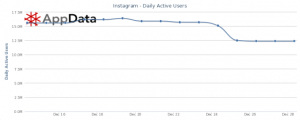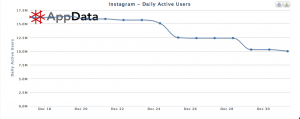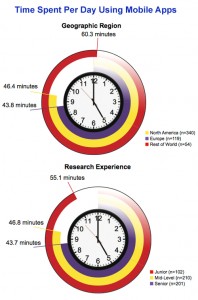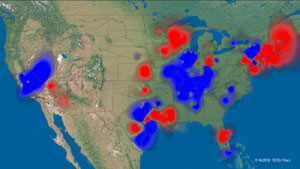Stuff says
Facebook’s Instagram lost almost a quarter of its daily users a week after it rolled out and then withdrew policy changes that incensed users who feared the photo-sharing service would use their pictures without compensation.
There’s two things wrong with this (apart from almost-explicit post hoc ergo propter hoc). The first is that the ‘quarter of its daily users’ is actually an estimate based on people who use Instagram in a way that shows up on AppData’s counters for Facebook apps. As AppData says
This application is integrated into Facebook from one or more platforms outside the Facebook.com canvas. As such, only users who connect to the app using Facebook are included in the active user counts above & below.
The Stuff story actually admits to this later, contradicting the lead. Even with the data just coming from a non-representative sample, the change in use is pretty dramatic, but the phrase ‘a week after’ in the story is also important. AppData shows just two weeks of data free, but we can put together the Dec 14-28 graph shown by Quartz when they covered this with the current graph from Dec 17 to now:


The new license agreement came out on Dec 17. Nothing happened for a week, then there was a decrease. On December 29 there was another decrease.
AppData’s results for weekly active users of Instagram didn’t change much over this period, and other apps also saw a decrease in daily users via Facebook — Stuff mentions Yelp, but I also saw it for Scribd, Spotify, Bing, and TripAdvisor. In fact, StatsChat has also seen a decrease in users via Facebook over the past week.
It could be that Instagram’s license mistake is reponsible for its decrease, but at this time of year there are other possible explanations for people changing their computer use habits. We’ll be able to tell in a month or so whether the decrease is persistent. Perhaps Stuff can revisit the issue then.




